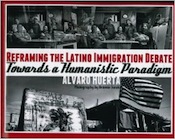In life, as the saying goes, nothing is certain except for death and taxes. I propose another: migration.
Migration represents a universal human right.
Some economists want us to believe that humans migrate, especially the global poor, to more developed countries for better jobs and higher wages. But throughout time, humans also migrate because of climate change, natural disaster, disease, violence, war, repression, dictatorships, religious persecution, drug and gang warfare, free trade agreements and global capitalism.
Humans have been in constant movement throughout history, and always will be. If migration is certain and constant, why do so many Americans and their leaders, particularly conservatives, fuss about Latino immigration to the United States?
As a scholar, I’m interested in this and other questions as I try to understand the complex nature of international migration. When leaders label immigrants “illegal aliens,” “anchor babies” or “threats to national security,” the greater society will have less sympathy for these human beings when they are exploited or deported.
Instead of attacking and objectifying immigrants, let’s appreciate their humanity and positive contributions to society. For me, this is not just an academic issue. It’s personal.
I will never forget the stories my father, Salomon Chavez Huerta, told me about his experiences in the U.S. as a guest worker under the Bracero Program during the mid-1900s, toiling in this country’s agricultural fields for meager wages.
I remember him telling me how he felt about being sprayed with chemicals and forced to live in overcrowded housing. He and other Mexican immigrants, his paisanos, were treated like beasts of burden. He was charged for food and rent from the company store. When people insult immigrants, I feel they are insulting the memory of my father.
Once my father’s agricultural contract expired, my family moved from a small rancho in the state of Michoacán to the border city of
 Tijuana. Once settled in Tijuana, my mother, Carmen Mejia Huerta, worked as a transborder domestic worker, cleaning the homes of Americans and raising their children.
Tijuana. Once settled in Tijuana, my mother, Carmen Mejia Huerta, worked as a transborder domestic worker, cleaning the homes of Americans and raising their children.
She treated these children like her own. And for this, what did my mother receive? Poor wages, lack of work benefits and disrespect.
During one of her extended work stays in the U.S., my mother was pregnant with me. With the help of extended family members in Sacramento, I was born in the California capital.
I was shortly reunited with my siblings in Tijuana, where I spent the first four years of my life. My parents eventually migrated to el norte and we settled in East Los Angeles’ notorious Ramona Gardens housing project.
My father worked as janitor, and my mother was a domestic worker in West Los Angeles. Thanks to their hard work, four of their eight children attended elite universities.
I received two degrees from UCLA and a doctorate from UC Berkeley. My wife graduated from UCLA, too. Our immigrant parents sacrificed so we could have opportunities not available to them in their home country.
We all benefit from immigrant labor, provided by millions of people like my parents. So why are Americans so fixated with borders? Can we imagine a world without borders?
Professor Bridget Anderson of Oxford University argues that, yes, we should strive for this reality. While some claim that her views represent a utopia, she counters that borders represent a dystopia.
Similarly, should we, those of us who envision a more just world, demand that President Barack Obama tear down our southern border?
In his book about the failure of borders, Walls Won’t Work, professor Michael Dear of UC Berkeley argues that the U.S. government should tear down the U.S.-Mexico border. Borders don’t work and will eventually come down, he contends.
We all started in one place and ended up in another place. We don’t know where we’ll land tomorrow. Before people judge and denigrate immigrants, they must ask themselves where their ancestors migrated from and if they have migrated or plan to do so in the future.
Dr. Alvaro Huerta is an assistant professor of urban and regional planning and ethnic and women’s studies at California State Polytechnic University, Pomona. He is the author of “Reframing the Latino Immigration Debate: Towards a Humanistic Paradigm,” published by San Diego State University Press (2013).